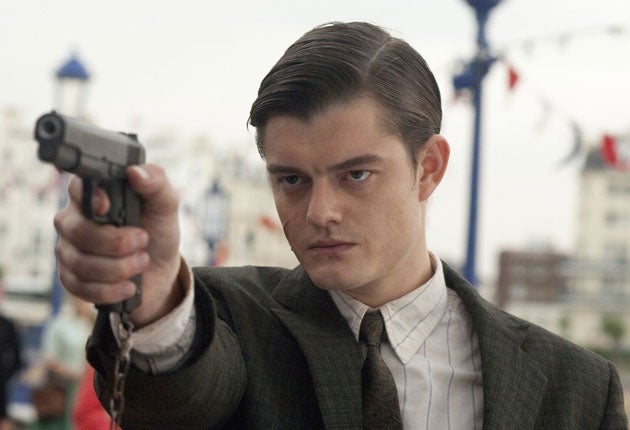Brighton Rock, Toronto Film Festival
It coasts along quite nicely

Graham Greene started out writing Brighton Rock as a screenplay, before turning it into his most famous novel. The first screen adaptation came in 1947, nine years after its first publication, when Richard Attenborough gave one of his finest performances as the violent young gang leader Pinkie Brown.
John Boulting's film is arguably the finest example of the British film noir. Many even consider it the greatest British film ever made. So it would seem that anyone foolish enough to do the remake is on a hiding to nothing. However, director Rowan Joffe, who won a Bafta for his TV drama The Shooting of Thomas Hurndall, has a few tricks up his sleeve, the primary one being to update the action to 1964.
The influence of 1960s-set Brighton biker movies such as Quadrophenia is strong both in the production design and the attitude of the principle protagonists, especially the women. Joffe uses the more modern context to make Rose a much stronger, less passive character. A breakthrough performance from Andrea Riseborough as the waitress who Pinkie decides to marry so that she won't be able to testify against him in a murder rap, implicates Rose as a more willing participant in the ruse.
She aggressively pursues Pinkie and her determination to be an independent woman is brought out in a riveting scene that brings to the fore Riseborough's fascinating ability to mix vulnerability with stubbornness, in which she steals Pinkie's money to buy a highly fashionable dress. The elements of Catholicism that feature strongly in the source material fade into the background as Joffe hammers home the changing role of women in a more secular society with an awkward reference to the arrival of the pill.
Helen Mirren is the surprising choice to play Ida. The busty barmaid from the book, who tries to convince Rose that she is making a huge mistake, is now working in a teashop. The change in her character to a more clued-up elder statesman ensures that Mirren joins the ranks of unlikely screen detectives – think Frances McDormand in Fargo – and her inquisitive nature and intuition ensure that she's a formidable foe for the brutish men.
Having to follow in the footsteps of Attenborough is an albatross around Sam Riley's neck. The Control star doesn't do a bad job as the murderer who digs himself deeper into trouble with his attempts to cover his criminal tracks, but by painting Pinkie as someone who does everything through force of will rather than charm, it's difficult to believe that Rose, in this more modern rendition, would fall for him.
Andy Serkis in a ridiculous wig gives a cavalier, exuberant turn as crime boss Mr. Colleoni. The scenes with Serkis highlight many of the film's faults, the main one being the erratic production design. In the hotel that Colleoni calls home, the furniture is too kitsch and gaudy; the messy marital home of Pinkie looks like a badly put together and unauthentic theatre stage; and the incorporation of bikers doesn't work because Joffe is unable to escape the fact that the source material lends itself to film noir. At times the movie still looks and feels like it's taking place in the 1930s. The odd mishmash of traditional and modern gives the film an uneven and at times distracting feel.
Join our commenting forum
Join thought-provoking conversations, follow other Independent readers and see their replies
Comments
Bookmark popover
Removed from bookmarks